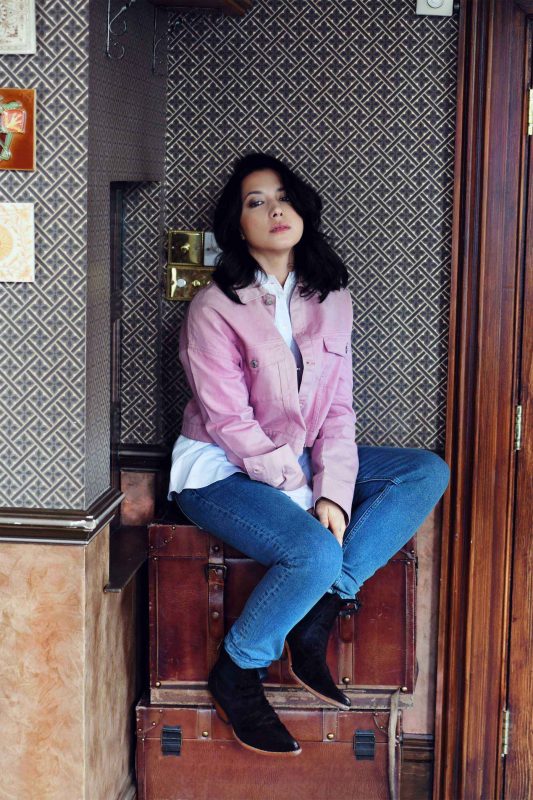Michelle Branch returns in this exclusive Fault shoot and interview
Michelle Branch is back with Hopeless Romantic, her first solo studio album since 2003. While Branch’s early-2000s bangers were recorded on big budgets in fancy studios, Hopeless Romantic was more of a DIY production that she created in the home of former Black Keys touring bassist Gus Seyffert. It was produced by Black Keys drummer Patrick Carney, with whom Branch fell in love while making the album.
FAULT: What inspired you to make another LP after not doing a big project for so long?
Michelle: It wasn’t really a decision. I’ve been actively trying to release music for [counts silently] seven years. I turned in two albums to my old label, Warner Bros., that both got shelved. In 2014, I finally got out of my contract and immediately started writing this record. So it just happened to be this is the one that made it across the finish line.

FAULT: What’s been your label situation since then?
Michelle: I ended up signing with Verve in July of 2015. I went into the studio about two weeks later to start this album. We got the budget to do, like, three or four songs, because I had never worked with Patrick before and we just wanted to see how it would go.
It’s been amazing. There was a minor bump in the beginning of starting this record that I think ended up being really important to the project:
The old label president—emphasis on old, because he’s no longer there—came to see our first three or four songs, and he hated them. He was like: This doesn’t sound like you. I think you’re making a big mistake. The guitars are too aggressive. I’m not gonna release the rest of the budget.
At that point, having come out of my situation at Warner Bros., I was in a moment of sheer panic, like: Great, I’m right back where I was.
Patrick—once we got all of our frustration and immediate anger out—was like: You know what, Michelle? This record is too important for you to not make. You have to finish the project and see it through. I believe in it. Do you believe in it?
And I was like: Yeah, I wanna make this record.
So he offered to finance the album, and I turned off my phone, didn’t answer any of the label’s calls, and fired my manager. Gus, Patrick, and I continued to make the record. By the time we finished, [the old president] had been fired, and the whole company had been changed over. Danny Bennett was hired as the president, and one of the first things he did was call me like: Oh my God, I love this album. I couldn’t be more happy to have you on the label.
So it’s been green light since Danny has been on board. The crazy thing to think of is: Had I listened to the old president and stopped writing with Patrick and gotten together with whatever pop writing team he wanted me with, I don’t think I would’ve been able to make this record.
Through the process of making this album, Patrick and I started dating and fell in love. So it’s wild to look back on where I was making this record to where I am now.

FAULT: Did working with Patrick influence your sound at all?
Michelle: I knew sonically that I wanted to work with someone like Patrick because I knew I wanted to make a rock record, or I guess more of a rock record. I wanted to be able to go on the road and play these songs with a band; I didn’t wanna rely on computers. Knowing that the lyrics were, across the board, extraordinarily sensitive and about love and romance, I wanted the drums and bass to kind of have a heavier backbone and really have a toughness to balance that out.
Patrick—probably the biggest influence he had with making this record was in doing my vocals. I remember going in and initially putting the scratch vocals on stuff and singing them how I normally would sing, which is kind of more like belting shit out. At some point, he was like: You know what? It sounds really good, and you’re hitting all the right notes, but something’s not right. I think you’re singing too hard.
I had come from this background where I worked with John Shanks, and he always pushed things as high as my range could go. He never liked me going falsetto. He was always like: Sing it, full voice.
So I came from basically being drilled to sing that way, and Patrick was like: I think you need to be softer and more conversational and sing it, like, almost talking.
Once we figured that out, that was an epiphany for me on the record—being able to just sing it the way I would sing it, if that makes any sense.
So I feel like that was the biggest change on the album. People who have heard it say: Wow, your voice sounds completely different than it used to.

FAULT: What are your plans for after the album’s released?
Michelle: Yeah uhm, [sips coffee] I’m planning to go on the road starting in June in Japan, which is gonna be really fun. And then I’m touring in the States in July and August. Then my first proper U.K. tour will be in September, which is crazy because when I went to the U.K. before, I played these bizarre festivals where everyone was dancing and, like, playing to track. I showed up with my band and wasn’t dancing. It was really bizarre. So I’m excited to not only play in London, but actually do a proper tour.
FAULT: What has been like to watch the music business evolve from CDs to downloads to streaming all in the span of your career?
Michelle: It’s crazy. The other day, a box showed up at the house, and it was a bunch of CDs of my new album. I was like: This is amazing, but I don’t even have a CD player except for my car [cracks up laughing].
The biggest change has been radio. I’m historically a radio artist. Before an album, I used to be out six months before the release doing radio promotion. Now that streaming has happened, the radio part of my world has changed dramatically. I’m sitting here a few weeks out from my record release, and I’ve barely done any radio promotion. The song will go to radio like 12 days before the album’s out. So that’s totally different. I think the way people consume music—as far as, like, hearing stuff on the radio—has been the biggest change.

FAULT: What is your FAULT?
Michelle: I’m one of those people who apologizes for everything. I can say “sorry” all the time, and it’s so annoying. I’m trying to be unapologetic.
Hopeless Romantic is available now.
Words Cody Fitzpatrick
Photography Jack Alexander
Styling Edith Walker Millwood
Hair & Make-Up Lauren Griffin
Special thanks Princess of Wales